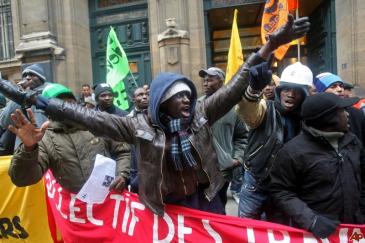
Far right movements are on the rise in Europe and France is no exception to that. These groups can be broadly defined by: their opposition to immigration, their belief that Islam threatens European and national values, their conspiracy theories and strong anti-establishment views . The French far right is often reduced to the Front National, but there is a number of small/medium sized groups (Bloc identitaire, Jeunesses Nationalistes) which are very active (street based activites). In this post I will explore the relationship between far right groups and Facebook.
Far right groups on Facebook: racist rhymes with fabulist
On Facebook, a huge number of far right groups post a constant flow of articles describing how immigrants are the cause of France’s problems. Muslims are their favourite targets. Some ridiculous stories can be read such as: « muslim immigrant gets 3000 € from the state while 96 year old french woman only receives 400€/month » or « mass immigration transforms France into a third world country ».
The usual us/them narrative is widely used. These reports are often unverifiable, oversimplifications of the reality and most of the time pure lies (see Le Monde for a number of far right news on Facebook/Twitter that proved to be fake here)
Comments are an important feature on Facebook. Just when you thought that the report was bad enough you start reading the comments. Often full of grammar and spelling mistakes, they are most of the time short and straightforward, and it looks like the more offensive a comment is, the more popular it gets.
 For instance one can read under this picture: « Look at the pic, is that what we really want for France? » or « islamists are sending these on purpose to invade Europe » « they look like cockroachs invading our country ».
For instance one can read under this picture: « Look at the pic, is that what we really want for France? » or « islamists are sending these on purpose to invade Europe » « they look like cockroachs invading our country ».
The French justice minister Christiane Taubira is more frequently abused on Facebook than any other member of the government. A Front National candidate posted this shocking picture earlier this year:  The author was later sentenced to 9 month in jail for this post. If you want to know more about the abuse received by Christiane Taubira you can watch this video from France 24: France 24 video (in english)
The author was later sentenced to 9 month in jail for this post. If you want to know more about the abuse received by Christiane Taubira you can watch this video from France 24: France 24 video (in english)
The audience: numbers, growth, identity
These appalling publications would have little or no meaning if they had no significant audience. Facebook gives indicators (likes/comments) enabling us to conduct a small audience analysis. The figures involved are quite astonishing. For example the page La gauche m’a tuer boasts more members (170k) than the ruling Parti Socialiste (100k). A quick research shows that there are many similar groups around 50k members. The openly anti-muslim « I eat pork and f*** you » has 80k likes. « Contre ceux qui crachent sur la France » even reaches 293k. Another group called « Hollande dégage » claims 570 000 followers. Using data offered on these groups, I wanted to determine whether what happened in France in January 2015 had had an impact on the statistics of this type of pages.

Surprisingly the stats don’t show any correlation between the « Charlie » events and the membership of this group. The growth is quite linear. Further analysis is required to assess the relationship between real life events and social media activities. I was quite amazed by the number of young people (mostly men) in my friends list (not anymore) sharing such views. Previous studies on the subject confirmed my feeling, according to Bartlett et al. : « Online supporters are primarily young men: an average of 63 per cent are under 30, and 75 per cent are male » (Bartlett et al., 2011, The New Face of Digital Populism).
Why Facebook boosts the rise of far right propaganda
Social media arguably played a major role in the rise of anti-immigration movements in France. My personal view is that a number of intertwined dynamics have led to a banalization of anti-immigrant discourse.And social media certainly is one these dynamics. Facebook has proved an unexpected ally for far right groups.
Early theories of social media argued that one of the main characteristics of this new form of media was that people would no longer be passive towards information. This had the potential to boost political participation: « Media users not only create media content themselves, but the new technology also enables them to become political subjects » (Nilsson, 2013, Swedish politicians and new media: democracy, identity and populism in a digital discourse). To a large extent the dream that social media would bring more democracy has turned into a nightmare for a number of reasons (in France and elsewhere).
First, far right pages writers/administrators are often anonymous and have no ethical guideline to follow which leads to poor information standards. Their goal isn’t to inform but to convince people. Facebook provides instant feedback on your persuasion and communication skills (likes, comments).
Second, those who like these far-right pages find a space where they can freely express their opinion. They know that other members (the audience) share similar beliefs. In other words these pages play the role of a community: it gives members self-assurance, support…
Third, instead of rational debates we are more and more confronted to hoaxes and manipulation as highlighted above. Social media « lends itself to a quickening of political discourse which is in some sense the currency of populists » and « the ease and the speed with which that misinformation spreads on these networks is remarkable » (Bartlett, 2013, Report from seminar: Liquid democracy or Populism?)
Far right movements saw platforms such as Facebook as an opportunity to break away from mainstream media. Patrick Rundell points to « the deeply rooted scepticism and suspiciousness (of far right parties) towards mainstream media » (Lundell, 2015, Mistrusting the media – now and then). The audience is equally suspicious. 77% of the French population don’t trust mainstream media reporting (IPSOS, 2014, Fractures Françaises).Interestingly, the exact same percentage of the population mistrusts politicians. For far right groups, social media provides a costless platform to challenge mainstream media, and a great opportunity to reach huge audiences. For the audience, these groups provide the free alternative newsreporting that they look for.
Facebook is a favorable environment for the growth of far right groups. One particular statistic underlines the particular relationship between social media and far right groups:
« For mainstream political groups, the ratio of formal members to facebook members is three-to-one. For every one facebook member there are three formal members. For far right groups, that ratio is reversed: there are three facebook members for every formal member. » (Carl Miller, 2012, Research Perspective)
This is obviously a major source of concern. Our digital involvement is likely to grow in the coming years and it looks like far right groups have gotten the most out of the process so far.
Marine le Pen’s campaigners?
The Front National is increasingly popular and a number of polls suggest that its ideas are also gaining more and more supporters. A large majority now believes that the state offers more help to immigrants than to natives, a recurring theme in anti-immigration propaganda on Facebook.
| Question | Agree (2006) | Agree (2013) |
| More help is offered to immigrants than to natives | 40 | 67 |
| Immigration is an opportunity for France | 49 | 37 |
| Enough is being done to tackle clandestine immigration | 45 | 24 |
Source: IFOP, 2013, Les Français et l’immigration (http://www.ifop.com/?option=com_publication&type=poll&id=2393) This poll shows a clear hardening of French public opinion on immigration. Anti-immigration groups on Facebook are strongly suspected to have played a part in this process, especially in the 18/30 year old age group.
Studies have shown that online involvement leads to increased political participation in real life (Nilsson, 2013). These groups are platforms where anti-immigration, racists beliefs are constructed, strenghtened. There is little or no challenging debate, and the fact that most members share the same ideas transforms ideas into beliefs and beliefs into truths.
Of course the main magnet of these negative energies is Marine le Pen. One can notice a countless number of messages openly calling for a Marine le Pen vote. She is portrayed by many as France’s saviour. However I would argue that a significant fraction of Les Republicains (formerly UMP) electors have very similar views on immigration.

As shown above, many of these groups are playing an active campaigning role. Administrators are often directly asking their followers to vote for Marine le Pen.
The Front National is posing a serious challenge to mainstream parties, and the role of social media in this process should not be underestimated. Far right groups on Facebook contribute to the radicalization and the popularisation of a nauseous ideology. They are directly and indirectly campaigning for Marine le Pen. This trend, along with the incapacity of mainstream parties to tackle the constant deterioration of the economic and social situation make 2017 presidential election very uncertain. Given the climate I expect Nicolas Sarkozy to lurch to the right once again. However this time his most serious rival will probably not be Mr Hollande but Mme Le Pen. This should lead to fascinating Facebook posts.


Very interesting article. It always strikes me as well when I see statistics about how few people believe in mainstream media, mostly because french public TV has partly very good quality journalism content. Unfortunately, it is very true as well that views on immigration don’t necessarily diverge between a certain number of Républicains representatives and FN representatives. That’s the reason why ex UMP representatives always go fishing on the very right side of their electorate amounting to stories like the « pain au chocolat » from Copé or the discours de Grenoble from Sarkozy (among many others). I think it is important french politicians can be audible for the population. Hollande has, same as Sarkozy before, disappointed many because of unfulfilled promises and those people more and more let themselves be seduced by the FN. This has many reasons, France is a difficult country to govern as it as a very heavy administration but at the same time, it has lots of advantages which have to lead it to bring back economic growth and to create jobs to lower unemployment, one of the main reasons why people turn their back on the main political parties.
Thanks for your comment, it’s always interesting to hear outsider’s views. I agree on most points. Economic growth is key, and Mr Hollande can’t find the keys. Q2 GDP 0% again, he is running out of time. However I’d argue that our societies place too much importance on GDP.
First of all, I think you should blog more often cause I enjoy your take on these topics. It’s a thin line between freedom of one’s opinion and defamation / spreading errnoeus messages. No one is being passive aggressive anymore. Who needs to hide their stereotypical, fallacious ideas when they can just hide behind the power of social media. Then again, that’s why I don’t have a Facebook anymore. Thank you for reminding me.